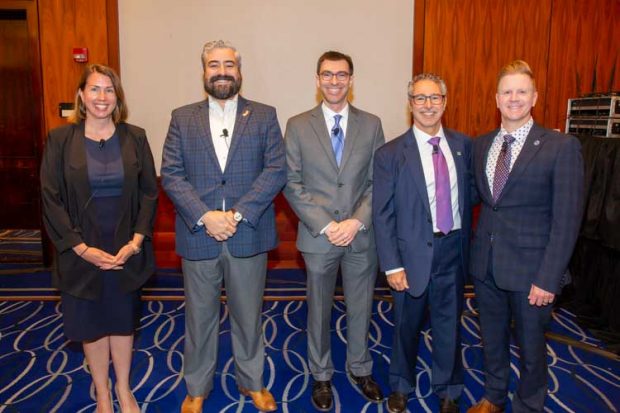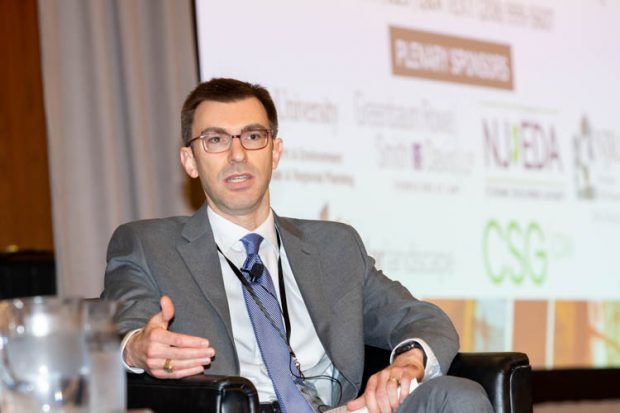New Jersey Future Blog
Planning for Tomorrow, Not Today
July 18th, 2023 by Zeke Weston

The State of Planning and Redevelopment in New Jersey plenary at the 2023 NJ Planning and Redevelopment Conference. Photo by Frank H. Conlon
“It doesn’t matter if we make every vehicle electric, and it doesn’t matter if we turn of all power plants; climate change will still get worse,” exclaimed Shawn LaTourette, the Commissioner of the New Jersey Department of Environmental Protection (NJDEP), during the 2023 Planning and Redevelopment Conference plenary, The State of Planning and Redevelopment in New Jersey, co-sponsored by New Jersey Future and the NJ Chapter of the American Planning Association. In fact, each of the four plenary speakers identified climate resilience as an eminent issue facing the state. Coordinated resilience planning, along with a comprehensive energy master plan, sustainable economic development initiatives, and an update to the State Plan were offered as prominent solutions throughout the discussion.

From left to right: Catherine Klinger, Executive Director, Governor’s Office of Climate Action and the Green Economy; Jorge Santos, Chief Real Estate Development Officer, New Jersey Economic Development Authority; Jeffrey Oakman, Senior Policy Advisor, Office of Governor Phil Murphy; Peter Kasabach, Executive Director, New Jersey Future; Shawn LaTourette, Commissioner, New Jersey Department of Environmental Protection. Photo by Frank H. Conlon
The plenary featured key state government executive branch officials from the Murphy Administration: Catherine Klinger, the Executive Director of the Governor’s Office of Climate Action and the Green Economy; Jeffrey Oakman, a Senior Policy Advisor in the Office of Governor Phil Murphy; Jorge Santos, the Chief Real Estate Development Officer for the New Jersey Economic Development Authority; and Shawn LaTourette, Commissioner of NJDEP. The plenary was moderated by Peter Kasabach, the Executive Director of New Jersey Future.
The purpose of NJ PACT is to update land use regulations to reflect the latest climate science to protect our state’s infrastructure from flooding.
NJDEP leads the climate change planning process in New Jersey, explained Commissioner LaTourette, and is one the region’s largest investors in climate resilience infrastructure. DEP’s statewide climate resilience strategy serves as a toolkit for agencies and municipalities to use when considering their own resilience approach. The most notable climate resilience action going forward will be a much needed update to the state’s climate and land use regulations, particularly regarding stormwater management and flood hazard rules. This regulatory reform effort is known as New Jersey Protecting Against Climate Threats (NJ PACT) and the first phase, the Inland Flood Protection (IFP) Rule, will be effective later this month. The data that informs current regulations for stormwater management and development in flood prone areas is outdated despite more frequent and intense storms and projected increases in rainfall. The purpose of NJ PACT is to update these land use regulations to reflect the latest climate science to protect our state’s infrastructure from flooding.

Catherine Klinger, the Executive Director of the Governor’s Office of Climate Action and the Green Economy speaking during the 2023 NJ Planning & Redevelopment Conference. Photo by Frank H. Conlon
Catherine Klinger explained how clean energy is crucial to the existence and health of New Jersey’s communities heading into the future. A comprehensive energy master plan that includes clean building guidance, climate pollution reduction strategies, and anticipated costs is vital to the state’s sustainability. The 2019 energy master plan was due to be updated in 2022, but because of numerous industry advancements, the state revised the schedule. The 2024 energy master plan will include updated data, new innovations, and anticipated costs. In addition to the statewide plan, Klinger noted that municipalities have the opportunity to develop clean energy infrastructure on their own in order to benefit their residents. Such infrastructure includes community solar arrays, public EV charging stations, thermal heat networks, and decarbonized vehicle fleets.

Jorge Santos, the Chief Real Estate Development Officer for the New Jersey Economic Development Authority, speaking during the 2023 NJ Planning & Redevelopment Conference. Photo by Frank H. Conlon
Jorge Santos detailed the significance of economic development initiatives for a sustainable New Jersey. The various economic development programs serve to improve planning and redevelopment processes and outcomes in the state. For instance, the new Stranded Assets Investment Program will help communities reposition unused assets like vacant office buildings and strip malls. This program is just one of over fifty active EDA programs, and the agency anticipates more programs to come. Through these programs, Santos explained how the EDA strives to create jobs and enhance economic activity where it is needed, while also improving diversity, equity, and inclusion.

Shawn LaTourette, Commissioner, NJDEP, speaking during the 2023 NJ Planning and Redevelopment Conference. Photo by Frank H. Conlon
The State Plan “serves as the connective tissue across state government in implementation.” – Commissioner Shawn LaTourette, NJDEP.

Jeffrey Oakman, a Senior Policy Advisor in the Office of Governor Phil Murphy, speaking during the 2023 NJ Planning & Redevelopment Conference. Photo by Frank H. Conlon
The panel unanimously agreed upon the need to update the State Plan. “I think we can all agree in this room that the state plan from 2001 is well overdue for an update,” Jeffrey Oakman joked while referring to the absence of climate change and equity considerations in the plan. Despite its age, the twenty-two year old document contains an abundance of important and useful information including guidance on center-based development, urban revitalization, and farmland preservation. Santos explained how the Economic Development Authority actively refers to the 2001 State Plan as a guide when developing and implementing its programs. Santos noted that updating the plan to be more relevant would be immensely helpful to the agency. For the update to be effective, Oakman suggested that it include environmental justice, economic justice, climate adaptation and resilience, and racial equity. Oakman also recognized the importance of improving the accessibility of the plan; making the document accessible online with user-friendly tools is vital for helping agencies and localities implement the plan’s priorities. The State Plan “serves as the connective tissue across state government in implementation,” stated LaTourette; therefore, ensuring that folks can easily engage with it and understand it is a critical component of the update process.
The importance of sensible and equitable planning and redevelopment is directly correlated with fostering healthy and resilient communities. For New Jersey, this means developing coordinated climate resilience planning, a comprehensive energy master plan, sustainable economic development initiatives, and a much needed update to the State Plan. The plenary, The State of Planning and Redevelopment in New Jersey, concluded with a multitude of questions from the audience. PRC attendees were eager for the panel to hear their questions, and the panelists were ready for whatever the audience threw at them. The energetic ending to a productive session, ignited synergy for further discussions on planning issues in New Jersey. For further reading on the importance of an updated state plan for NJ, please read “Launching the Next State Plan”, which explored this topic at a breakout session at the conference.
Related Posts
Tags: clean energy, climate change, climate resilience, Development, infrastructure, pollution, state plan, State Planning, stormwater management, sustainability, Transportation
















